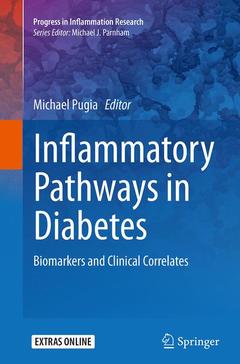Description
Inflammatory Pathways in Diabetes, Softcover reprint of the original 1st ed. 2015
Biomarkers and Clinical Correlates
Progress in Inflammation Research Series
Coordinator: Pugia Michael
Language: English
Subjects for Inflammatory Pathways in Diabetes:
Publication date: 10-2016
Support: Print on demand
Publication date: 10-2015
Support: Print on demand
Description
/li>Contents
/li>Biography
/li>Comment
/li>
This book discusses recent advances in new anti- and pro-inflammatory pathways in diabetic disease, and identifies new diagnostic immunological methods that offer potential companion diagnostics for diabetic diseases. New methods in proteomics, mass spectroscopy, immunological assay design, measurement of cellular signal transduction and protease inhibition are used to clarify new biochemical pathways. Biomarker validation in animal models and correlations in humans for diagnostic clinical trials shed new light on the impact of diabetic diseases. The book reviews current understanding of inflammatory pathways in the pathophysiology of insulin resistance, metabolic syndrome, nephritis and other diabetic inflammatory conditions, and is the first to describe the impact of novel adipokines, protease inhibitors and complement markers. By presenting new methodologies for biomarker discovery, it provides a valuable resource for researchers studying clinical diagnosis, drug development, bio-analytical chemistry, proteomics and biochemistry. It is also useful for those conducting clinical and biological studies for targeted drug development. The methodologies and approaches can be applied to other markers, and the information will be helpful in the preparation of research grant applications.
Introduces new diagnostic immunological methods for diabetic diseases as potential companion diagnostics, developed in collaboration with leading universities, medical schools, and industrial experts
Reviews progress in understanding of new inflammatory pathways in diabetic diseases
Provides new methodologies for biomarker discovery
These books may interest you

Obesity and Cancer 189.89 €



